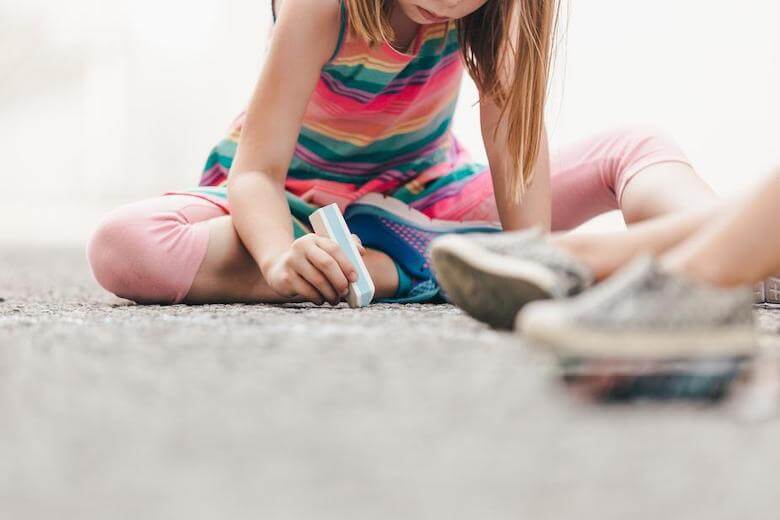
There’s been some buzz on media lately, talking about the way our kids are just too busy these days. As parents, we want the best for our kids, so we fill their day with anti-boredom activities and learning opportunities. Swim class, soccer, dance, playdates – and the list goes on.
But what happened to the days when mom and dad expected kids to entertain themselves? Where are the balls to kick against a wall and bikes to scoot around with, aimlessly? Why isn’t poking a stick in the grass to find bugs a ‘thing’ anymore? We’ll give you a hint: it still can be! Did you know that there are benefits of downtime for kids? They need it!
Below, we’ll explain why downtime and unstructured play time is a good thing for children.
1) Downtime helps with emotional regulation and stress release
Let’s state the obvious: when kids have downtime, they rest. And, they need it. So do parents!
Learning how to de-stress through relaxation techniques is becoming known as an important part of living a healthy, physical and emotionally-regulated life. It goes for adults, too. But some schools these days are starting to incorporate exercises like mindfulness and yoga, to help kids relax. And that’s for a good reason.
You see, learning how to be calm doesn’t just happen when you’re stressed and need a way to cool down. It starts with practicing the ability to be calm at any time. So, if you know how to bring yourself to a calm state, those rough times will be easier to manage. This is a great lesson for kids to learn early in life. And downtime is needed for that. Being able to stop and relax is good practice for kids!
See related on our blog:
- The importance of sleep in early childhood
- Pros and cons of co-sleeping with your toddler or child, and how it affects daycare
- 4 Strategies to help your toddler get a good night’s sleep
- Do young kids need sleeping aids like melatonin? Keep these things in mind
2) Downtime for kids means they can take a moment to for learning reflections
This point is important because of what it implies. Reflecting on learning means no more fast-paced absorption of information (for a little while). It means no screen time and no video games. Downtime can be equated with ‘rest and do nothing’, and that can be equated to watching TV, or browsing the web. But that is totally not what experts mean when they talk about “downtime.”
See related on our blog:
- Should young children be using electronics and media?
- 12 YouTube channels for toddlers and preschoolers
- 13 apps to help young kids learn
Downtime can be thought of as unstructured play. Or even laying down for a bit. But it’s not useless. The time can be used to somehow reflect on learning that a child has already acquired. They can put something into practice. For example, reading a book on their own. Even if it’s just about noticing the detailed strokes on the drawings in a picture book, or practicing their phonics by sounding out letters quietly, this can be downtime.
They can daydream. They can play out imaginary, out-of-this-world story lines. They can stare at clouds in the sky to think of what shapes they resemble. These times are important. They let the mind wander. And the mind usually wanders to things we already know. It’s a built-in review process our brain likes to do, before the ‘exam’ of ‘real life’ happens!
See related on our blog:
- 5 Imagination games to play with toddlers and young kids
- 4 Benefits of kids telling their own stories
- 4 reasons to encourage play in early childhood years
3) Downtime produces a healthy amount of boredom, which makes kids creative
We may think of boredom as a negative thing. But it’s not! We don’t have to battle boredom for our children. On the one hand, it’s part of life. They can learn how to bring themselves out of boredom.
But more importantly, boredom is good for you! If you think about it, that is when you start to brainstorm. It gets creative juices flowing. Not to mention, downtime for kids is helpful in a world where we are always ‘plugged in’ to social media, avoiding boredom at all costs. It’s draining, and the mind needs rest from it all. Boredom is a great ‘filler’ for that much-needed respite, given its benefits.
This point has even been researched. Below is a video that explains it all, including the interesting results of inducing boredom
https://www.youtube.com/watch?v=LKPwKFigF8U
Don’t go thinking the benefits of downtime for kids are the only thing they need!
Above, we’ve given some top benefits of downtime for kids. But, we don’t want to come of as advising the extreme. It’s still great for kids to have structured activities in their schedules. It’s all about balance. And, it’s also about letting go of the guilt that you’re not doing enough. Children should learn how to entertain themselves, self-reflect and learn to calm down easily. It’s not a bad thing. But remember: too much of a good thing can be a bad thing! So be sure to make time for both!
Sources for this article, in addition to the above in-text links, include:
- https://www.voanews.com/science-health/kids-brains-need-more-downtime-research-shows
- https://www.babble.com/parenting/kids-need-downtime/
- https://www.babygaga.com/downtime-kid-study/
- https://www.pbs.org/newshour/health/whats-conflicted-parent-scheduling-childs-summer
- https://www.mommyinme.com/how-to-deal-with-kids-boredom/
- https://www.mommyinme.com/do-children-need-downtime-5-reasons-why-downtime-is-must-for-kids/
- https://health.clevelandclinic.org/is-your-child-overscheduled-kids-need-down-time/
- https://health.usnews.com/wellness/for-parents/articles/2017-09-28/is-your-child-getting-enough-real-downtime
